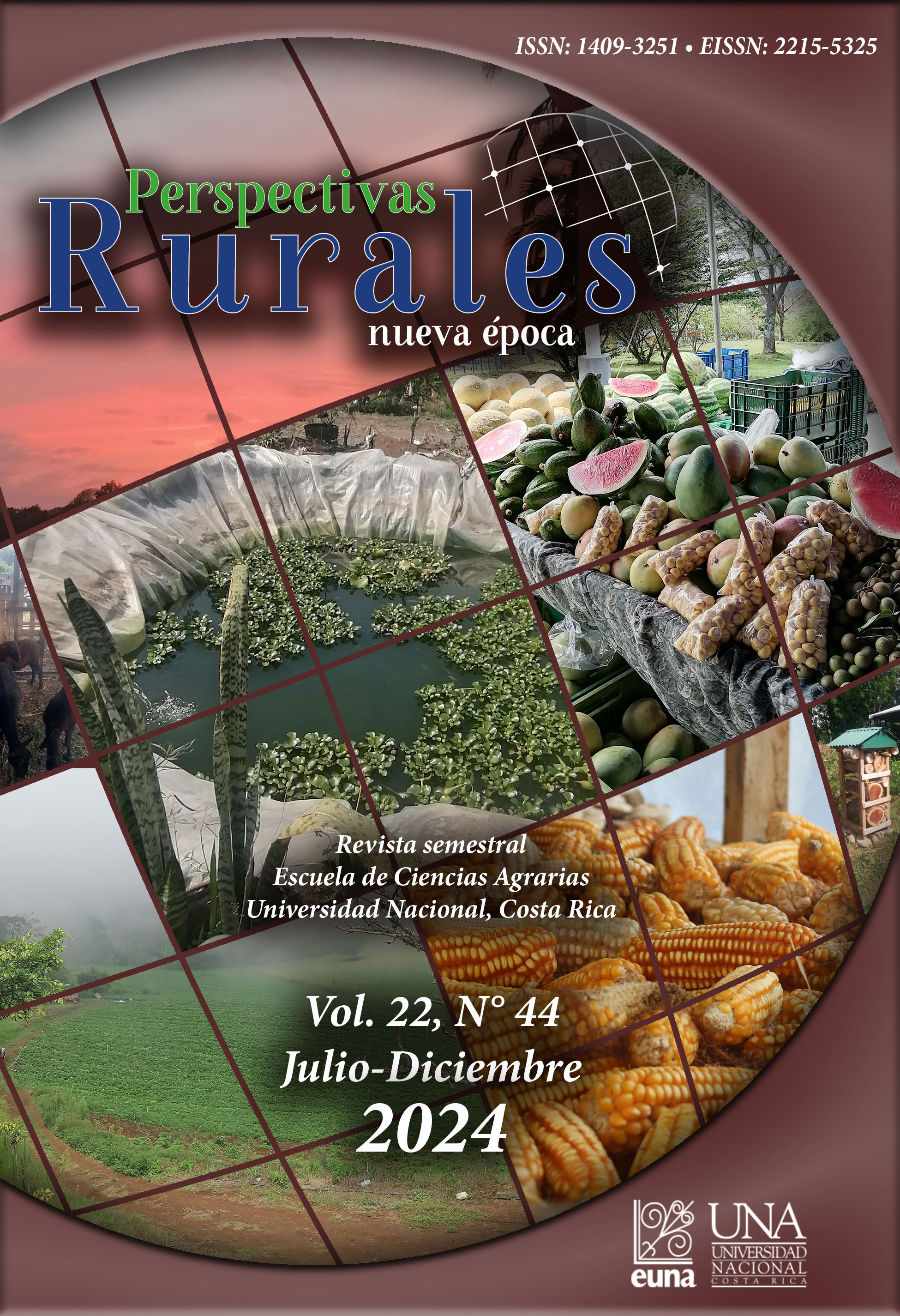Credit assess and welfare status of smallholder: evidence from farmers in Kwara state, Nigeria
DOI:
https://doi.org/10.15359/prne.22-44.1Keywords:
Income, Credit sources, Farmers, agricultural investments, SustainabilityAbstract
Lack of proper access to credit poses a major threat to agricultural production and food security globally, yet commercial bank, co-operative societies, microfinance banks, agricultural development programs, non- governmental organizations, government agricultural schemes offer loans to low-income individuals who have need of it despite the challenges encountered in accessing and managing it by farmers. However, there is limited research on the effectiveness of credit programs in improving the welfare of smallholder farmers in Kwara state, Nigeria. Therefore, the nexus between credit assess and welfare status of smallholder farmers in Kwara state, Nigeria was analyzed. Quantitative data was collected from 120 smallholder farmers selected through a three multi-stage sampling techniques. Data was analyzed using descriptive statistics, per capita expenditure, per capita income, and ordinary least square. Results showed that most respondents were middle-aged married males engaged primarily in farming, with moderate education, experience and income levels. It was also revealed that there is high awareness and use of credit. The major source of credit for the respondents was cooperative societies (60%) with least of agricultural development programs (3.92%). Overall, 58.93% of smallholder farmers had access to credit. Key perceived benefits were investment in agriculture (32.50%) and increased productivity (31.67%), and diversification of farming activities (20.83%). The significant factors influencing the welfare status of smallholder farmers include credit amount, age and household size. Based on these findings, it is recommended that both formal and informal sources of credit be established for farmers within the farmers’ vicinity.
References
Adegboye, M. (2016) Socio-economic status categories of rural dwellers in Northern Nigeria. Advances in Research, 7(2), 1–10. https://doi.org/10.9734/AIR/2016/21836
Adeniyi, O., Ogunsola, G. (2014). Cocoa production and related social-economic and climate factors: A case study of Ayedire Local Government Area of Osun State, Nigeria. Russian Journal of Agricultural Sciences. 2014. 2(4): 161-187. https://www.researchgate.net/publication/280766588_Cocoa_Production_and_Related_Social-Economic_and_Climate_Factors_A_Case_Study_of_Ayedire_Local_Government_Area_of_Osun_State_Nigeria
Adetunji, M. (2013). Assessment of the quality of urban transport services in Nigeria. Academic Journal of Interdisciplinary Studies, 2 (1): 49 – 58. https://www.richtmann.org/journal/index.php/ajis/article/view/61
Ayenew, W., Lakew, T., Kristos, E. (2020). Agricultural technology adoption and its impact on smallholder farmers welfare in Ethiopia. African Journal of Agricultural Research, 15(3): 431–445. https://doi.org/10.5897/ajar2019.14302
Carranza, M., & Niles, M. T. (2019). Smallholder farmers spend credit primarily on food: gender differences and food security implications in a changing climate. Frontiers in Sustainable Food Systems, 3. https://doi.org/10.3389/fsufs.2019.00056
Dawuni, P., Mabe, F., Tahidu, O. (2021). Effects of village savings and loan association on agricultural value productivity in Northern Region of Ghana. Agricultural Finance Review, 81(5): 657-674. https://www.emerald.com/insight/content/doi/10.1108/AFR-02-2020-0024/full/html
Ehiakpor, D., Danso-Abbeam, G, Dagunga, G., Nsobire, S. (2019). Impact of Zai Technology on Farmers’ Welfare: Evidence From Northern Ghana. Technology in Society 59 – 101189: 1-8. https://doi.org/10.1016/j.techsoc.2019.101189
El-Komi, M. (2010). Poverty: Alleviation through microfinance and implications on education. [Doctoral Thesis] The University of Texas at Dallas.
Etim, N., Thompson, D., Onyenweaku, C. (2013). Measuring efficiency of yam (Dioscoreaspp.) produciton among resource poor farmers in rural Nigeria. Journal of Agriculture and Food Sciences. 1(3): 42-47. https://www.cabidigitallibrary.org/doi/pdf/10.5555/20143025675
Girei, A., Saingbe, N., Ohen, S., Umar, K. (2018). Economics of small-scale maize production in Toto local government area, Nasarawa state, Nigeria. Agrosearch 18 (1), 90–104. https://doi.org/10.4314/agrosh.v18i1.8
Idrisa Y., Ogunbameru B., Shehu H. (2012) Effects of adoption of improved maize seed on household food security in Gwoza Local Government Area of Borno state, Nigeria. Global Journal of Science Frontier Research Agriculture & Biology 128(5): 7-12. https://globaljournals.org/GJSFR_Volume12/2-Effects-of-Adoption-of-Improved-Maize-Seed.pdf
Ileka, C., Agumagu, A., Ifeanyi-Obi, C. (2020). Development needs of rice farmers in Anambra state, International Journal of Agricultural Economics, Management and Development, 8(1): 146-163. https://daeeksu.com/wp-content/uploads/2021/04/Ileka-et-al..pdf
Ministry of Agriculture and Rural Development KWSG (2019). Kwara State Agricultural Policy. https://kwarastate.gov.ng/ministry/ministry-of-agriculture-natural-resources/#department
Lakhan, G., Channa, S., Magsi, H., Koondher, M., Wang, J., Channa, N. (2020). Credit constraints and rural farmers’ welfare in an agrarian economy. Heliyon, 6(10), October, e05252. https://doi.org/10.1016/j.heliyon.2020.e05252
Mgbenka, R., Mbah, E., Ezeano, C. (2015). A review of smallholder farming in Nigeria: Need for transformation. International Journal of Agricultural Extension and Rural Development Studies, 3(2), 43-54. https://eajournals.org/ijaerds/vol-3-issue-2-may-2016/
National Bureau of Statistics. (2017). Demographic Statistics Bulletin. Federal Republic of Nigeria. https://nigerianstat.gov.ng/elibrary/read/775
Nwaru, J., Essien, U., Onuoha, R. (2011). Determinants of informal credit demand and supply among food crop farmers in Akwa Ibom State, Nigeria. Journal of Rural and Community Development, 6(1). https://journals.brandonu.ca/jrcd/article/view/618
Ojiem, J., Franke, A., Vanlauwe, B., De Ridder, N., Giller, K. (2014). Benefits of legume–maize rotations: Assessing the impact of diversity on the productivity of smallholders in Western Kenya. Field Crops Research, 168, 75-85. https://doi.org/10.1016/j.fcr.2014.08.004
Ojo, M., Mohammed, U., Ojo, A., Yisa, E., Tsado, J. (2009). Profit efficiency of small scale cowpea farmers in Niger State, Nigeria. International Journal of Agricultural Economics and Rural Development. 2(2), 40- 48 https://www.researchgate.net/publication/353269936_Profit_efficiency_of_small_scale_cowpea_farmers_in_Niger_state_Nigeria
Oloyede, W., Muhammad-Lawal, A., Amolegbe, K., Olaghere, I., Joseph, I. (2021). Comparative analysis of the profitability of rice production systems in Kwara State., Nigeria. Agrosearch, 20(2), 82-101. https://doi.org/10.4314/agrosh.v20i2.7
Omotesho, K., Akinrinde, F., Adenike, A., Awoyemi, A. (2019). Analysis of the use of information communication technologies in fish farming in Kwara State, Nigeria. Journal of Agribusiness and Rural Development, 54(4), 327-334. https://doi.org/10.17306/J.JARD.2019.01223
Robert, F., Frey, L., Sisodia, G. (2021). Village development framework through self-help-group entrepreneurship, microcredit, and anchor customers in solar microgrids for cooperative sustainable rural societies. Journal of Rural Studies, 88, 432–440. https://doi.org/10.1016/j.jrurstud.2021.07.013
Sakhno, A., Polishchuk, N., Salkova, I., Kucher, А. (2019). Impact of credit and investment resources on the productivity of agricultural sector. European Journal of Sustainable Development, 8(2), 335-345. https://doi.org/10.14207/ejsd.2019.v8n2p335
Simonyan, J., Umoren, B., Okoye, B. (2011). Gender differentials in technical efficiency among maize farmers in Essien Udim Local Government Area, Nigeria. International Journal of Economics and Management Sciences, 1(2): 17-23. https://www.hilarispublisher.com/open-access/gender-differentials-in-technical-efficiency-among-maize-farmers-in-essien-udim-local-government-area-nigeria-2162-6359-1-012.pdf
Ullah, A., Mahmood, N., Zeb, A., Kächele, H. (2020). Factors determining farmers’ access to and sources of credit: evidence from the rain-fed zone of Pakistan. Agriculture, 10(12), 586. https://doi.org/10.3390/agriculture10120586
Waje, S. (2020). Determinants of access to formal credit in rural areas of Ethiopia: Case study of smallholder households in Boloso Bombbe district, Wolaita zone, Ethiopia. Economics, 9(2), 40-48. https://www.sciencepublishinggroup.com/article/10.11648/j.eco.20200902.13
Published
How to Cite
Issue
Section
License
Copyright (c) 2024 Osasona Kehinde Kikelomo, Salami Mercy Funke, Rotimi Olamide Faith y Belewu Kafayat Yemisi

This work is licensed under a Creative Commons Attribution-NonCommercial-NoDerivatives 4.0 International License.
![]()
Revista Perspectivas Rurales. Nueva Época se encuentra bajo una licencia Creative Commons Reconocimiento-NoComercial-CompartirIgual 4.0 Internacional License.
Creado a partir de la obra en http://www.revistas.una.ac.cr/index.php/perspectivasrurales
Los autores/as que publiquen en esta revista aceptan las siguientes condiciones:
- Los autores/as conservan los derechos de autor y ceden a la revista el derecho de la primera publicación, con el trabajo registrado con la Licencia Creative Commons Atribución-NoComercial-CompartirIgual 4.0 Internacional, que permite a terceros utilizar lo publicado siempre que mencionen la autoría del trabajo y a la primera publicación en esta revista.
- Los autores/as pueden realizar otros acuerdos contractuales independientes y adicionales para la distribución no exclusiva de la versión del artículo publicado en esta revista (p. ej., incluirlo en un repositorio institucional o publicarlo en un libro) siempre que indiquen claramente que el trabajo se publicó por primera vez en esta revista.
- Se permite y recomienda a los autores/as a publicar su trabajo en Internet (por ejemplo en páginas institucionales o personales) antes y durante el proceso de revisión y publicación, ya que puede conducir a intercambios productivos y a una mayor y más rápida difusión del trabajo publicado.






 :
: 
